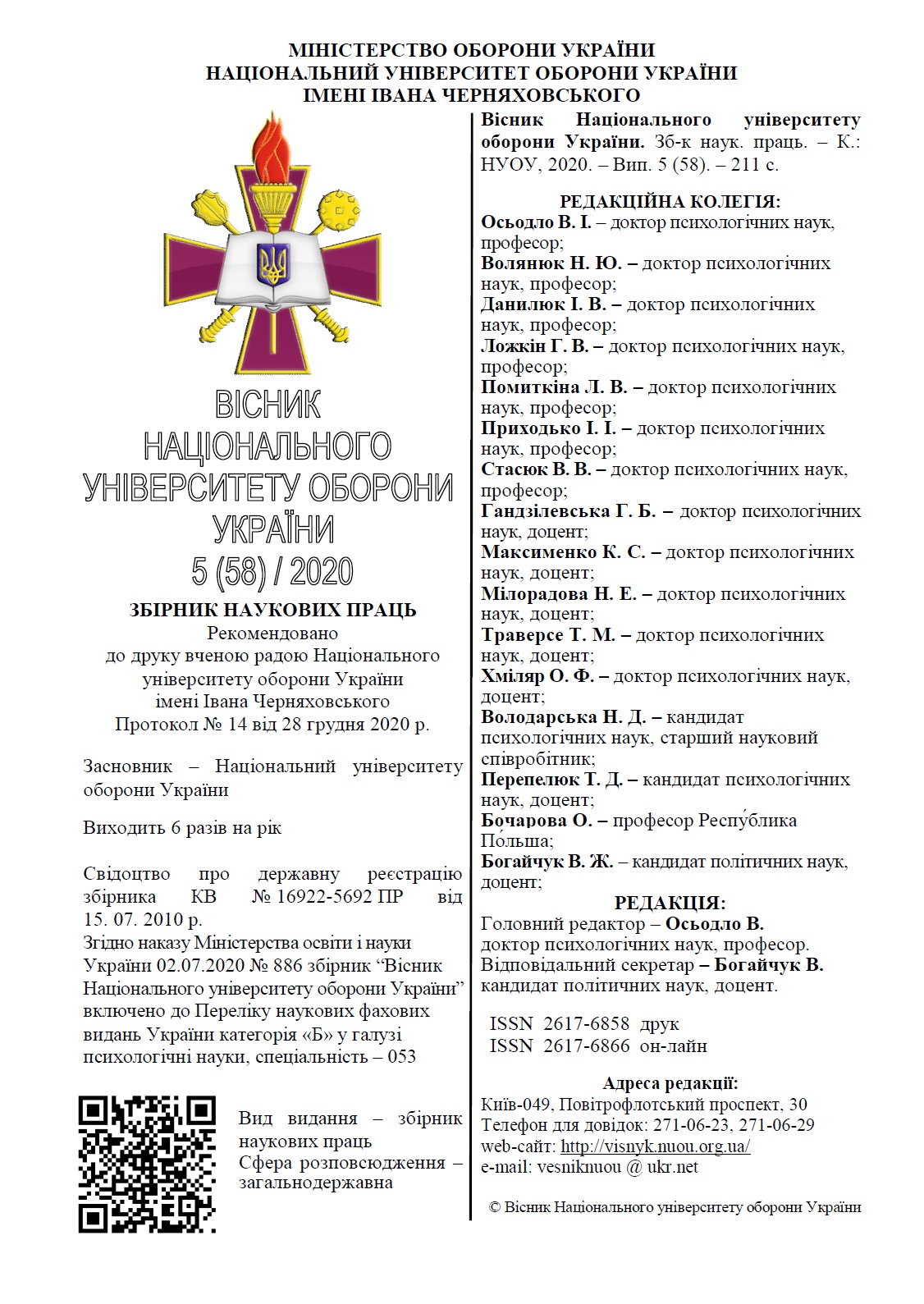САЛЮТОГЕНЕТИЧНА СПРЯМОВАНІСТЬ ЯК ЧИННИК ПСИХОЛОГІЧНОГО БЛАГОПОЛУЧЧЯ ОСОБИСТОСТІ
DOI:
https://doi.org/10.33099/2617-6858-2020-58-5-146-152Анотація
Представлено короткий виклад теорії салютогенеза. У статті розглядаються аргументи А. Антоновського про здатність людини радіти і жити щасливо, якщо у неї є глибоке почуття когерентності. З огляду на те, що людина на своєму життєвому шляху постійно переживає різні труднощі, показано, які внутрішні ресурси можуть зміцнити її, допомогти впоратися зі стресами та сприятимуть досягненню психологічного благополуччя.Завантаження
Посилання
Сердюк Л. З. Структура та функція суб’єктивного благополуччя / Л. З. Сердюк // Актуальні проблеми психології: Інститут психології імені Г. С. Костюка НАПН України. – Том ХVII. – № 4 (11). – С. 124–133.
Шамионов Р. М. Психология субъективного благополучия личности / Р. М. Шамионов. – Саратов: Изд-во Саратовского университета, 2004. – 174 с.
Antonovsky A. The Life Cycle, Mental Health and the Sense of Coherence /A.Antonovsky // Israeli Journal Psychiatry and Related Sciences. 1985. – Vol. 22. – N4. – Р. 273-280.
Antonovsky A., Bernstein J. Pathogenesis and Salutogenesis in War and Other Crises: Who Studies the Successful Coper? /A. Antonovsky, J. Bernstein // Stress and coping in time of war: generalizations from the Israeli experience / Ed. N.A. Miigram. N.Y.: Brunner/Mazel, 1986. – P. 52-65.
Antonovsky, A. (1987). Unraveling the mystery of health—How people manage stress and stay well /A.Antonovsky. – San Francisco, CA: Jossey-Bass.
Bowling, A. A multidimensional model of the quality of life in older age / A. Bowling, D. Banister, S. Sutton, O.Evans, & J. Winsdor// Aging & Mental Health, 2002.–Vol.6(4). – Р. 355-371.
Deci T. L. The “what” and “why” of goal pursuits: Human needs and the self-determination of behavior / T. L. Deci, R. M. Ryan // Psychological Inquiry. 2000. – Vol. 11. – Р. 227–268.
Diener E. Happy People Live Longer: Subjective Well-Being Contributes to Health and Longevity / E. Diener, MY. Chan. Appl Psychol Heal Well-Being, 2011.
Dolan, P. Measuring subjective wellbeing for public policy: recommendations on measures. Centre for Economic Performance special papers (CEPSP23) / P.Dolan, R. Metcalfe // Centre for Economic Performance, London School of Economics and Political Science, 2011. – London, UK.
Gable S. What (and Why) Is Positive Psychology? / S.Gable, J. Haidt// Review of General Psychology. 2005. – Vol. 9. – N 2. – P. 103-110.
Koltko-Rivera, M. E. The psychology of worldviews / M. E. Koltko-Rivera // Review of General Psychology, 2011. – Vol.5. – Р. 8, 3–58.
Rigby, B.T. Do causual attributions mediate the relationship between personality characteristics and life satisfaction in adolescence? / B.T.Rigby, E.T. Huebner // Psychology in the Schools, 2005. – Vol. 42. – Р. 91-99.
Ryff, C. (1995). The structure of psychological well-being revisited / C.Ryff // Journal of Personality and Social Psychology, 1995. – Vol. 69, – Р.719-727.
Seligman M. Positive psychology / M. Seligman, M. Csikszentmihalyi // American psychologist. – 2000. – Vol. 55. – № 1. – P. 5–14. – Режим доступа: http://dx.doi.org/10.1037/0003-066X.55.1.5
Serdiuk, L. Psychological well-being of future specialists in the integrated educational environment and the factors of its formation / L. Serdiuk // Social welfare : interdisciplinary approach. – 2011. – №1(1). – P. 44–51.
World Health Organization (2018). World health statistics 2018: monitoring health for the SDGs, sustainable development goals. https://apps.who.int/iris/handle/10665/272596





